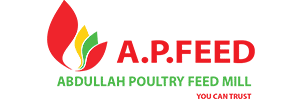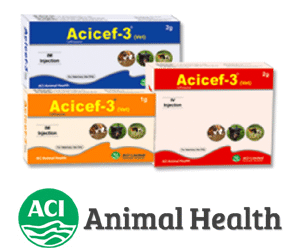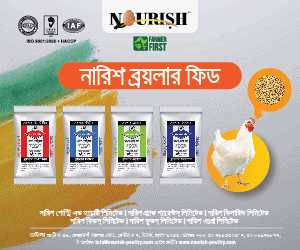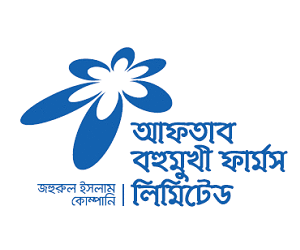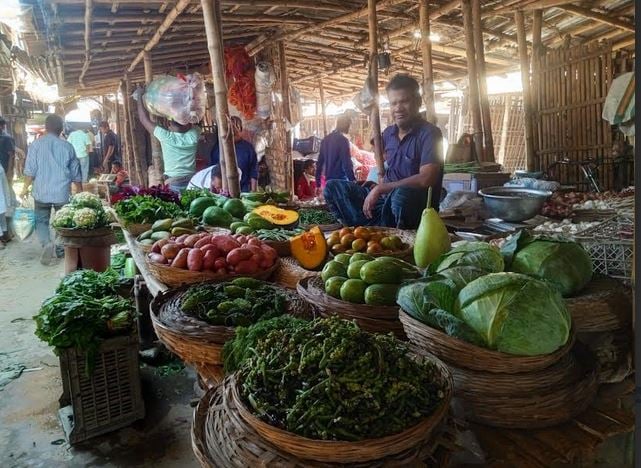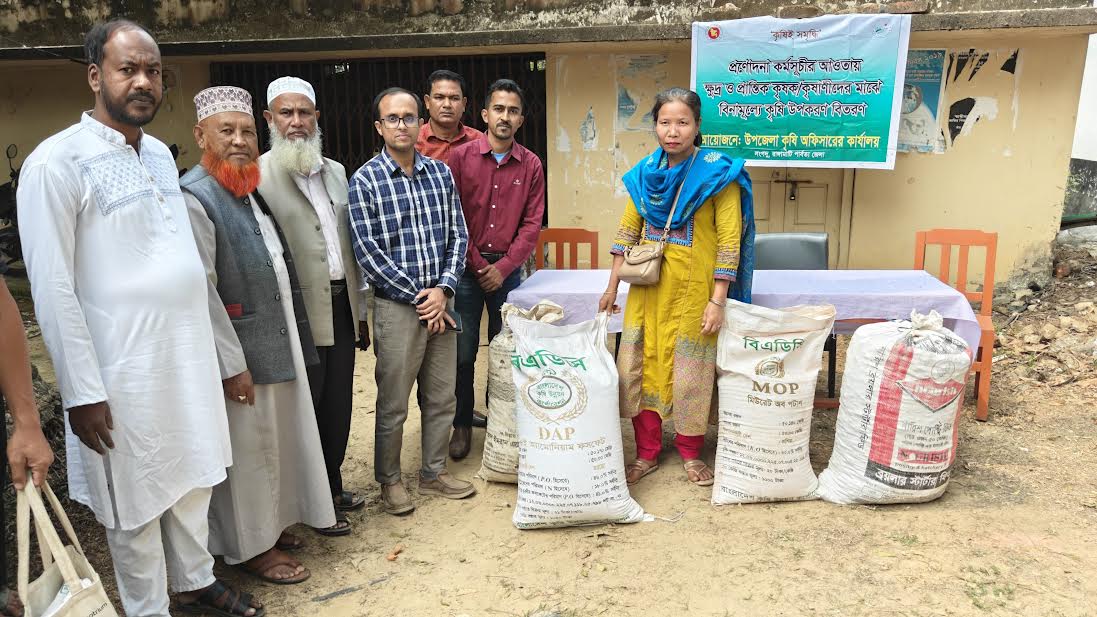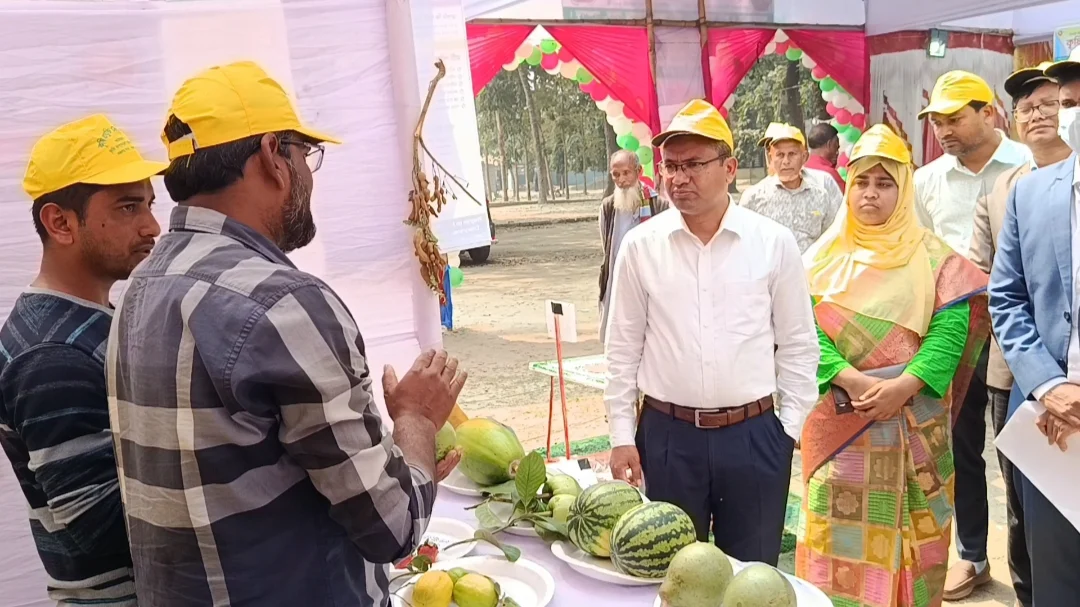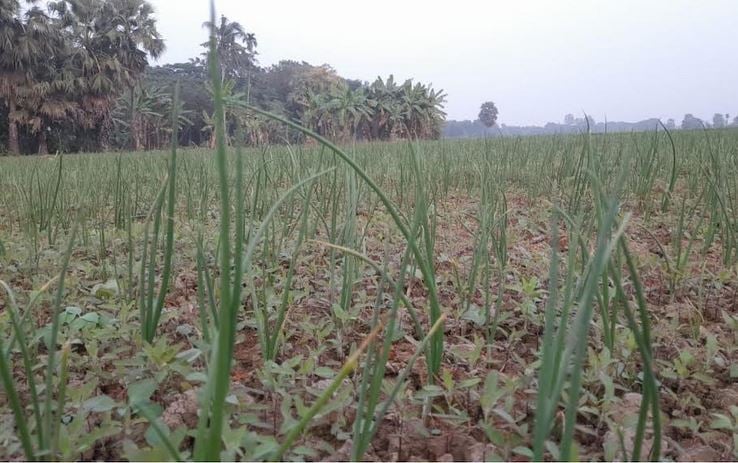Challenges and opportunities of turkey production in Bangladesh
পোলট্রি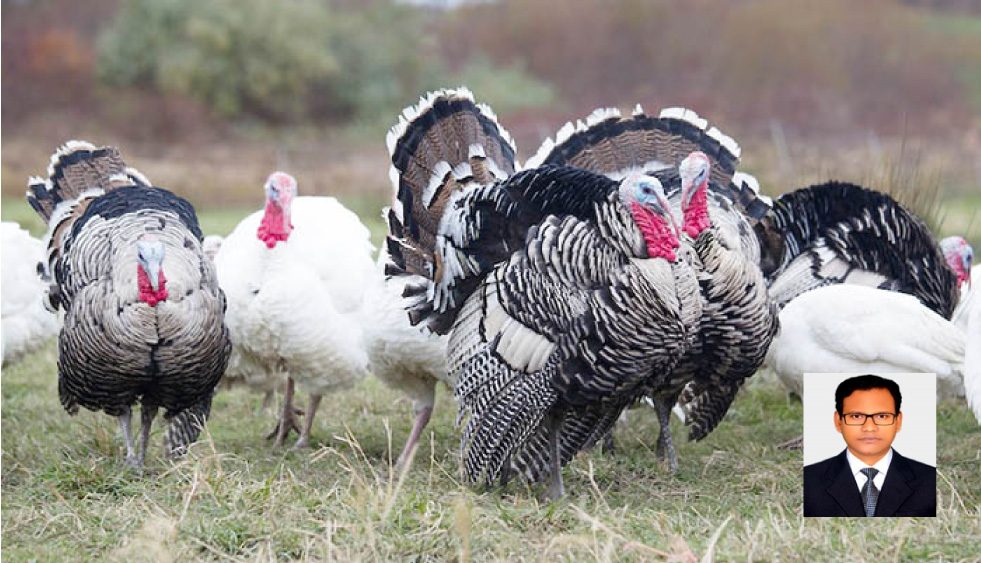
The introduction of turkey production in Bangladesh is very new; in fact, turkey is a newly introduced poultry species in Bangladesh. As a result, there is no specific information on how, when and from where turkey production has been started in this country. However, it can be assumed that the birds entered in Bangladesh through cross-bordering from the neighboring countries. As many farmers reported about 9-10 years ago the birds came to Bangladesh and mostly reared in northern parts (Naogaon, Bogura, Dinajpur, Natore, Sirajgonj) and southern part and later the birds become widespread all across the country. It has been claimed that few enthusiastic farmers in Narshindhi district, in particular Palash upazila, were pioneer in raising turkey. At the earlier stage, the birds are only reared for ornamental purpose as a part of hobby by some enthusiastic and hobbyist farmers. Afterwards, turkeys quickly adjusted to our local environmental condition and thrive well under low plane of nutrition (low cost feed), housing and also management practices. Thus, it drew rapid and quick attention of some poultry farmers because of it have unique and remarkable phenomena in adaptability to wide range of climatic conditions and can be raised successfully almost everywhere if they are well fed and protected against diseases, predators and adverse weather conditions. Furthermore, the birds have a special attribute for scavenging, ability to consume huge green grasses, leaves and vegetables and that eventually would reduce the overall production cost. In the recent years, many poultry farmers including small and medium scale poultry farmers, enthusiastic unemployed youth reared 50-200 turkeys at their homestead premises and getting profit by selling the poults. At right now, may be 1500-2000 small and medium scale turkey farmers in operation, of which, almost all are keeping birds as parent breeders who basically selling poults for quick profit from small investment. However, rearing turkey was not much popular to the general farmers, primarily might be because of the birds were not well known to poultry keepers. The turkeys that are available in Bangladesh, mostly heritage birds and it might enter in Bangladesh from neighbouring countries.
- Major Challenges:
- Lack of turkey feed and feeding standard:
Actually, there is no turkey feed in the market. Even, there is no nutrients specification for feed preparation in Bangladesh. So, farmers fed their turkeys by homemade feed as well as a mixture of homemade and broiler/layer feed. They did not know the scientific nutrients requirements for turkey for feed making which leads poor growth, egg production and overall poor performance of turkey. On the other hand, though turkey is a good forager, some of the farmers did not know this fact so that they could not reduce feeding cost.
- Inadequate technical support:
As turkey is newly introduced poultry species in Bangladesh, so we have lack of knowledge on its rearing. At this condition, they need more technical assistance from different govt. and non-govt. line agencies, which is not sufficiently present in field level.
- Day old poult mortality:
Actually, day old poult is usually very weak compared to other poultry species. For this reason, mortality of this poults show higher under our village traditional husbandry practices.
- Poor housing facility:
Poor housing condition is very common in small- scale farmers’ level. Farmers do not give scientifically accepted space for their turkey. Actually, they give space on the basis of assumption. Moreover, they were not well aware of using suitable litter materials and its management. Most of the farmers do not take special care their turkeys against extreme hot and cold condition which ultimately hampered productivity of turkeys.
- Low egg fertility and hatchability:
The egg fertility and hatchability of turkey is low in comparison to chicken egg. Basically, none of the farmers used AI technique and even have no idea about turkey breeding. For this reason, at the old age of Tom when it reaches to heavier weight sometimes fail to jump at mating which leads low egg fertility. At this stage, need practice of AI to maintain proper fertility and hatchability.
- Lack of capacity development facility:
Lack of opportunity for capacity development of turkey farmers. Actually, they do not have any access to receive training, getting information, participating in workshop and seminar etc.
- Low market opportunity:
The farmers do not sell their turkey in market timely due to lack of meat consumption pattern in locality. In addition, as a turkey is heavy in weight in terms of high price, so consumers show negative attitude to purchase. Actually there is absence of well-organized market for turkey and its products. No structured market value chain has been identified yet in Bangladesh. Although, turkey meat is being sold in departmental stores in capital city and other large city in the country, a large number of consumers were not habituated of taking turkey meat and egg yet.
- Major Opportunities:
- Poverty reduction and nutritional security:
Bangladesh is one of the world’s most densely populated countries; about 31% of people live below the national poverty line. And most of the people remain in nutritional insecurity due to incapability to mitigate the demand and supply of animal protein. However, poverty reduction and nutritional security are the key consideration of the Government of Bangladesh to achieve Sustainable Development Goal (SDG) of the country. Production of small- scale turkey can also attributes, at least in a part, to achieve SDG by poverty reduction and nutritional security.
- Adaptability of turkeys with local environment:
The adaptability of turkey with our local environment is really remarkable. However, the birds have unique phenomena of scavenging, capability to consume locally available feed resources including huge amount of green grass and vegetables and unconventional feed i. e. water hyacinths that eventually would reduce the production cost. Besides, it is a unique bird which is suitable for rearing in hot humid climatic condition. For all these reasons turkey is becoming popular gradually in Bangladesh.
- Sustainability of small and medium scale farmers:
The farmers who become destitute by investing their last resource in commercial broiler and layer farming could sustain and run their enterprises successfully because turkey farming provides them- an alternative option whichever they eagerly waiting for long time. Moreover, they have long experiences, pre-existing setup like poultry shed and other necessary equipment and accessories.
- Low disease prevalence
In comparison to other poultry species, turkey is more disease resistant and mortality rate is very low. Turkeys are resistant to Marek’s and infectious bronchitis and commonly encountered with other diseases like mycoplasmosis, fowl cholera, and hemorrhagic enteritis. Actually, farmers used to vaccine for New Castle disease and Fowl pox.
- Low feeding cost
Feed cost represents two third of the total cost in poultry production. So, it would be valuable when birds eat less but perform at the same level as their coincidence. Turkeys are good foragers and can obtain added nutrients from forage because they are better able to digest fiber due to larger microbial population in their tract. So that, this feeding behaviour could reduce feeding cost. Turkey rearing is profitable as long as poults (day old turkey) are properly fed and take care of, and cost of production is cheap as almost 50% of the feed they eat is green vegetables and field grasses as supplement to commercial feed.
- Alternative source of income and protein:
Many consumer claims that they do not like broiler meat personally due to taste and confusion whether the broiler meat is safe or not and also red meat for their health concern. Under these circumstances, turkey meat would be an option or choice due to less fat and cholesterol content and it could be an effective alternative source of protein. Moreover, this bird is quite suitable for uplifting livelihoods of small and marginal farmers as it can be easily reared in free range under intensive and semi-intensive system with little investment. It may create good opportunity for unemployed youths to start farming and earn income. Turkey bird has a promising potential to be an alternative to livestock in meat production.
- Opportunity to use artificial reproductive technique:
There is an opportunity to promote AI technique in turkey for the production of commercial hatching eggs as natural mating sometimes-resulting infertile eggs. It will decrease cost of rearing more toms. It is reported that a well-developed pectoral muscle in turkeys, has prevented turkey toms to mate naturally, and making AI necessity. In addition, efficiency of use of semen could be increased because each tom can produce enough sperm to inseminate approximately 30 hens.
- Supply of safe and quality poultry meat:
Since the birds kept on semi-scavenge-based natural feed resources, it can be assumed that the consumers will gladly accept the meat produced in an eco-friendly organic environment.
- Opportunity to develop entrepreneurship:
At present, most of farmers are comparatively educated and self-starter. So, there is a huge possibility to develop turkey entrepreneurs at turkey cluster area in Bangladesh. They can be able to receive technical knowhow easily on overall turkey rearing.
Conclusion:
At present, turkey production is facing some challenges and decreasing day by day in our country. However, we need to take necessary steps to overcome the challenges and make it to be a good source of income, nutrition and employment generation, especially for the unemployed youth, rural women and the small-marginal farmers to take part the SDG of government. So, both private sector and government bodies should give financial and technical support to farmers and related stakeholders for rearing turkeys and establish a strong marketing chain for easy access to all local, national and international market of its eggs and meat.
Written by-
Md. Altaf Hossain,
Consultant & PhD fellow,
Bangladesh Agricultural University






